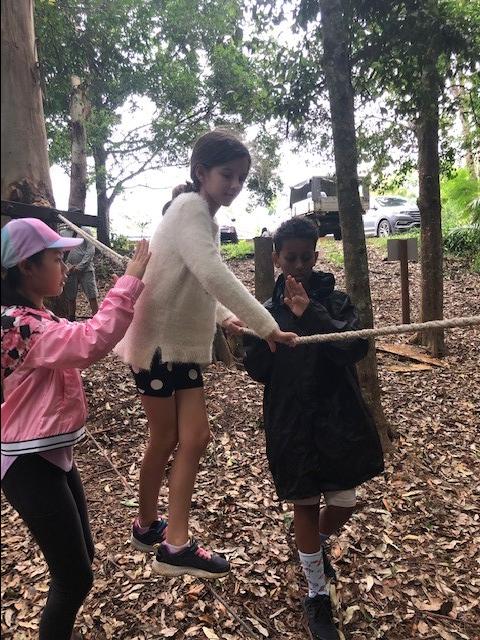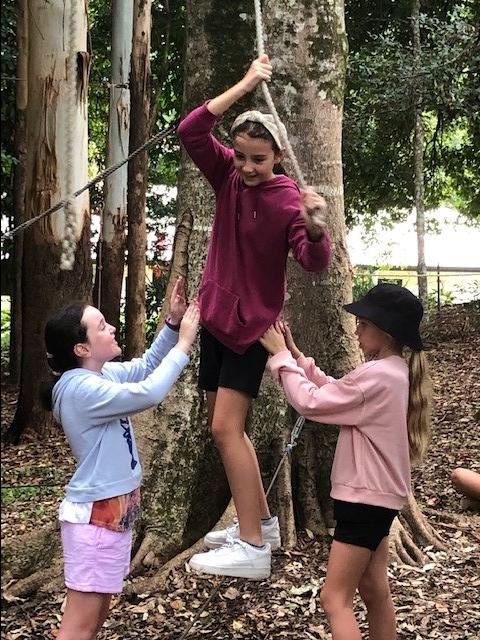Outdoor Education -
The Magic of Experiential Learning
Mrs. Audrey Fellowes - Deputy Principal - Head of Primary

Outdoor Education -
The Magic of Experiential Learning
Mrs. Audrey Fellowes - Deputy Principal - Head of Primary
I have had the privilege to experience Outdoor Education from different platforms, as a teacher, a camp instructor, and finally sending my own children off to school camp. One of my first experiences, after attending my own school camps, was working as an instructor one summer in picturesque Lake Arrowhead, California. This camp extended students beyond the classroom walls and provided progressive learning experiences. One of the most critical elements for students from this experiential learning was an improved awareness of group dynamics. Students left the camp with an increased understanding of human impact and a respect for themselves, each other and the environment. For three weeks, the traditional textbooks were brought to life as students touched, saw and immersed themselves in the outside world. The connectedness and learning in this beautiful environment were beyond anything I had seen in a classroom.
Although I had a tangible understanding of the mechanics of camp and knew the significant benefits, by far the most difficult experience for me was sending my eldest daughter to camp. Of my three children, she was the least suited or passionate about going off to school camp. She was anxious for weeks leading up to camp and I even thought about not sending her, because it felt easier to keep her at home rather than going through the stress of the days ahead for our family. I grappled with knowing the exhaustive list of benefits that come with camp and my child’s profound anxiety. As a teacher, I had seen first- hand the homesickness and anxiety melt away after watching students in fits of laughter as they tried to set up their tents for the first time, or zoom down the water slide, or make their first fireside s’mores filled with gooey marshmallow and chocolate. Through tears and considerable begging not to go, she eventually went on her first school camp and truth be told, I didn’t sleep too much for those nights. I was the first mother who arrived to greet the bus on their return to school, and thankfully she chatted all the way home about how much fun it was. This was the first of many school camps for her, and while she definitely prefers the comforts of home and hotel-style glamping, now as a young adult, she reflects positively on the challenges of camp and would even go as far as to say, some camps were the highlight of her time at school!
Improved social skills are one of the advantages of attending a well-structured school camp. An important life lesson is the ability to interact well with others. A family setting can be taught to a degree, but experience in larger groups for extended periods of time is a great way to hone these skills. Most activities at camp involve teamwork, which is wonderful to strengthen established friendships and to develop new friendships by connecting with children they don’t regularly talk with at school. Through bonding activities, children develop supportive relationships not only with different friends but also with their teachers. Spending six hours a day at school is one thing but eating meals together, travelling together and sharing accommodation teaches children the worth of working together and treating others with respect.
When children spend time away from home, they learn about the diversity of others and a view into how to do things differently. A family generally has a predictable approach to routines – dinner, social interaction and bedtimes. Breaking out of the family environment for a short period of time builds independence, resilience and some children even come home with a greater appreciation for their family and home life! When away from parents, children will often be more adventurous and willing to try new things.
For many children, school camp is their first time away from family and home for a few nights. There is a development of independence skills, where parents are not there to remind their children to eat their vegetables, brush their teeth, or to have a shower. Camp is an opportunity for children to grow up by learning how to take care of themselves and do things independently. Most children rise to the challenge and learn to rely on themselves when they spend time away from home.
The development of decision-making skills is a natural bi-product of camp. Should I go with my friends or should I do the activity I really want to do? Should I have the third bowl of spaghetti? Should I stay up or go to bed? Supervising teachers are not able to hover over each child all the time; therefore, children are responsible for making more of their own choices.
During camp, children are exposed to authentic nature-based experiences providing an increase in environmental awareness. Hands-on activities in the outdoors stimulate all senses and facilitate learning. Children become more aware of the environment, develop outdoor skills and an appreciation for nature.
These are all wonderful benefits of camp; however, what if you have a child who presents with anxiety about going to camp? Here are some helpful tips:
Preparation is the key to feeling less anxious
Talk with your child about their worries and fears. Discuss the activities they will be doing. Which ones will be challenging? Which ones will be fun? Practice sleeping away from home by having sleepovers at a close friend or family member’s home. Visit the camp’s website and take a look at pictures of where they are going. Together, you can even create a special “storybook” that they can look at on the days before camp.
Pack together and make it fun
Give your child the responsibility of checking that they have all the required equipment and take them on a special shopping trip to buy what they are missing.
Give your child a special journal to take with them on camp
You can write encouraging messages that they can read while they are away. They can also write or draw things they will like to share with the family once they are back home.
Consider counselling or speak to the teacher
An experienced child psychologist can help your child identify the source of their anxiety, learn how to overcome and replace unhelpful thoughts, and use other practical strategies to minimise their anxiety.
This week is the beginning of our Outdoor Education Program, where Years 4 and 5 are the first to attend camp. We wish all our students from Years 4 to 10 a fantastic outdoor education experience this term, and we look forward to hearing all the stories upon their return. A sincere thanks to our staff who give so much of their own time to accompany the students ensuring they make lifetime memories.



